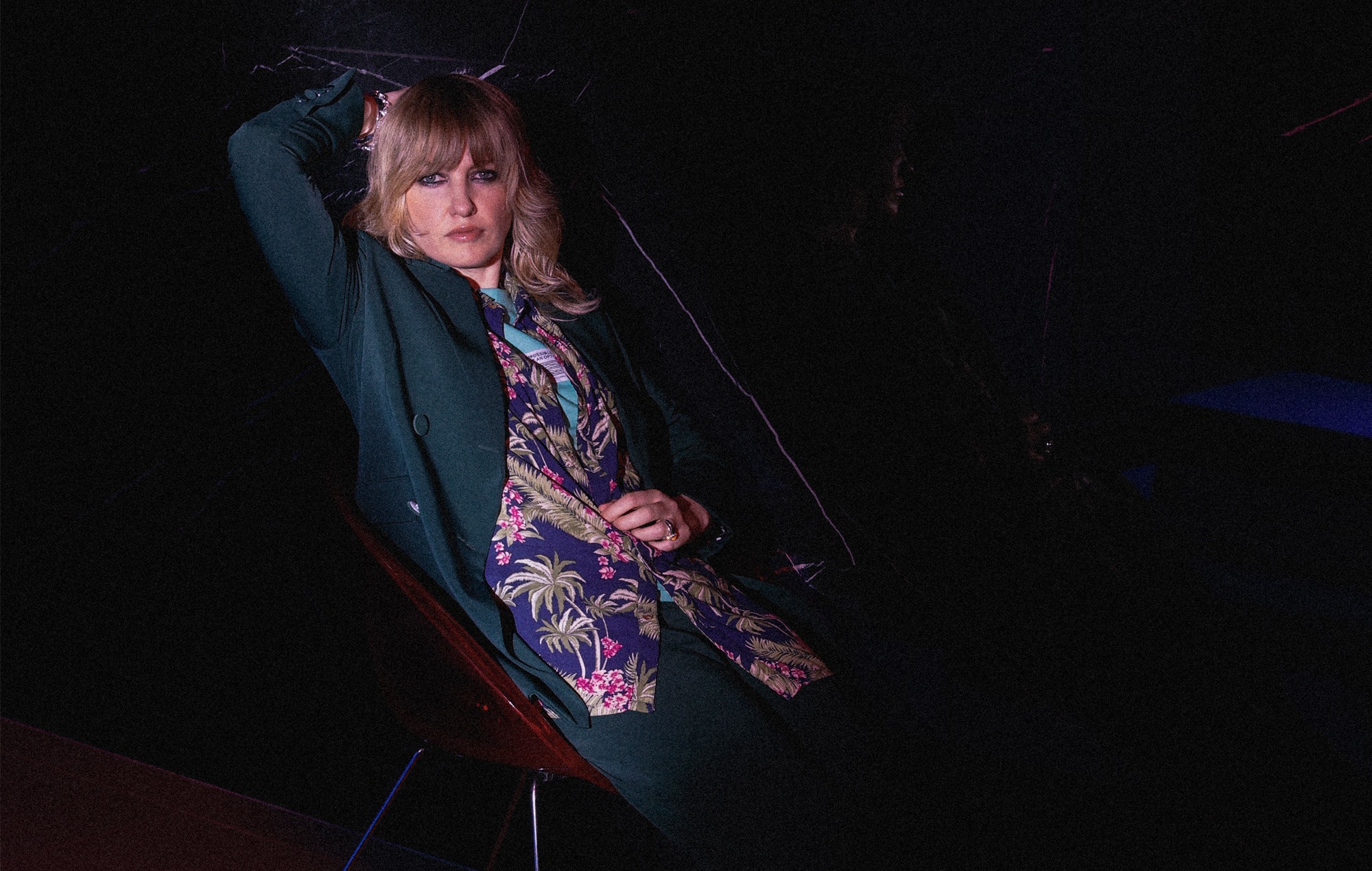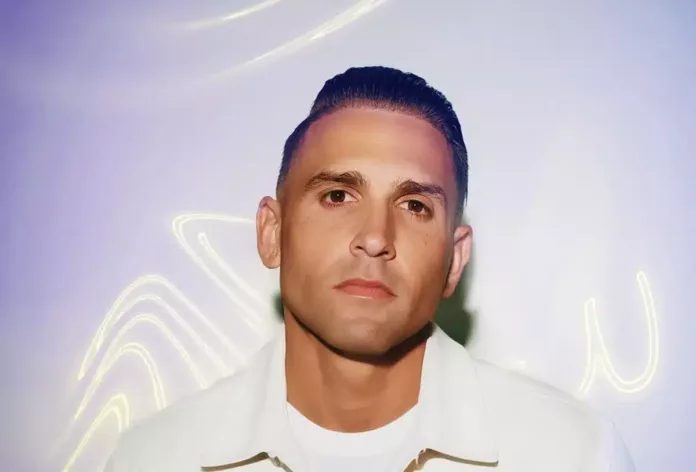
Ladyhawke: “I kept saying, ‘Am I going to die?’ and the doctors couldn’t say no”
There’s a catching, childlike earnestness to Pip Brown, better known as Ladyhawke. “I’m a dreamer, so I can very easily be transported into another world,” she says. Throughout the pandemic, the avid gamer was inspired by indie storytelling video games, like investigative horror Phasmophobia and fungus-zombie series The Last of Us, a game that centres queer characters. “I can go along for the ride and believe what I’m seeing.”
Brown is speaking with NME from her home in Aotearoa/New Zealand, her study backlit with soft lilac lighting, her sea-foam green guitar leaning against a towering pile of gaming paraphernalia. Brown arrives to our interview late after a “wild morning” wrangling a non-compliant toddler into day clothes, sending her off to her grandmother’s so that mum can promote ‘Time Flies’, Ladyhawke’s fourth studio album out today.
Despite becoming busier in recent years, Brown’s latest record seems freer than 2012’s ‘Anxiety’ and 2016’s ‘Wild Things’. Charged-up single ‘Mixed Emotions’ brings the late-2000s electronica and catchy, deadpan chants Brown’s known for, while ‘Take It Easy Mama’ evokes the youthful joy of The Jackson 5. The lusty, disco-funk fever-dream ‘Think About You’ sounds like it was designed to revitalise deadened dancefloors.

After a long history of struggling with self-consciousness, Ladyhawke has flicked away her inner critic and fully devoted her attentions to more playful pastures. “I don’t think about myself like I used to, you know?” she says. “I used to be quite self-involved and worried about everything.”
Back in 2018, 10 months after she gave birth to her and her wife’s daughter, Billie Jean, Brown was diagnosed with a Clark Level 5 melanoma. “I kept saying, ‘Am I going to die?’ and the doctors couldn’t say no.”
Her surgeons “removed a lymph node” and performed a “wide excision in the back of [her] leg”, and Brown’s been cancer-free since (“I still need quite regular checks,” she adds, “that’s the anxiety in my life at the moment”). For Brown, those uncertain two weeks – spanning her diagnosis and the results of her surgery – a period when she didn’t know if she’d live to see her daughter grow up, caused a shift within the artist.
“‘Don’t tell anyone you have a girlfriend’ was the advice I got given”
Ladyhawke’s music has always been candid, but on ‘Time Flies’ she’s more direct, even vulnerable. Braver. “Don’t be alarmed now, but she never wanted you,” Brown sings on ‘Reactor’, voicing her frustration with men who feel entitled to women’s desire and get “pissed off” when rejected.
“It’s like they feel threatened, and I’ve had that experience so many times,” she says. “And I know so many other queer woman who have as well, you know? I was just having a little moment where I was like, I’ve got to write this song because I was just sick of it.”
“Every time I pray, I just pray to be free,” Brown sings on arena-pop anthem ‘Guilty Love’. Co-written with Georgia Nott of Broods, the song addresses Catholicism’s fire-and-brimstone approach to stamping out queerness among its constituents. “I remember just like, being terrified of hell,” she says, thinking back to her Catholic schooling. “What a scary thing to tell kids.”
Homophobic ideology followed Brown out of school and into her journey through the music industry. “I think, as Ladyhawke, people never really have known where to put me,” says Brown. “The labels struggled, and no one knew what to do with me.
“I remember right at the beginning of my career being told I wasn’t allowed to talk about my sexuality. ‘Don’t tell anyone you have a girlfriend’ was the advice I got given. I also got told ‘No one wants to see you walking down the street holding hands with a girl.’” She laughs. “And I remember thinking, ‘I’m sure lots of people would, actually.”
Brown wasn’t alone. Many of her LGBTQ+ peers coming up at the same time received “this exact same advice”, she says, that advice being: “‘Oh, no, it’s completely different in the music industry. Yeah, you can’t be gay. That’s gonna ruin your career,’” Brown recounts.
Was she pressured to conceal her sexuality because members of the industry wanted Brown desirable to men? “I assume that’s what it is. I never asked. I just couldn’t. It’s something I’m still getting therapy for because it really messed me up, feeling like me-just-being-myself wasn’t enough, you know? I’m just so glad it’s different now.”
Brown has found a deepened sense of belonging in gaming, recently forming a tight friendship with three younger queer gamers. “They just teach me every day,” Brown says. She uses an LGBTQIA+ tag while streaming on Twitch to bring the community together, but sometimes homophobes and misogynists seek it out to “troll bomb” the chat with hostile comments.
“The unfortunate thing with gaming is that there’s a whole world of cis dudes who are pissed off at a) me being a woman gaming, and b) me being queer,” Brown explains. “I have mods and they delete [the comments] really quickly. But that’s a shitty side of it. I’m so stoked that I’ve got this amazing community around me, and we support each other.”
“I can scrap a whole song without seeing it through to the end because one element doesn’t sound the way I want it to”
It’s been 13 years since Ladyhawke first landed with cosigns by Kylie Minogue and Courtney Love. Listening through her back catalogue, what strikes is the sheer variety of synthesised textures she deploys in her music. If you’re in search of fun, eclectic sounds, Brown’s oeuvre is a goldmine. “That’s one of my favourite things,” she adds, “I love quirky sounds.”
She brightens as we dive into the musical elements she thrives on: ’80s nostalgia; the “grit and crackle” of old synths and microphones; vintage tech. Brown holds up a picture of a studio mic by Electro-Voice, a brand favoured by Dolly Parton and Elvis, that she used across the ‘Time Flies’ record.
Asked whether her attention to (sonic) detail stems from her Asperger’s syndrome, which she was diagnosed with in her 20s, Brown pauses. “I’m not sure,” she says. “I think my obsessive traits have gone into my music quite a lot.”
In part, Brown attributes her tendency to fixate to her recently diagnosed obsessive-compulsive disorder. “It’s not the [kind] that you always see portrayed in TV shows or films where you like, turn the light switch on or off and wash your hands a million times – it’s the cyclical thoughts.
“I get obsessed on something, and then the thought goes around, around, around,” – she twirls her finger in the air as she speaks – “around, around, around in my head until I can’t function.” Brown laughs. “I’ll get a pain in my head and then I’m like: I’m dying of a brain tumour.” She takes medication for the condition now, “which is great. But it would get so bad that I would be like, crying and in a shaking mess. I couldn’t cope because I couldn’t stop thinking about it.”
She continues, “I’ll hear an idea in my head before it’s down; like, I’ll know a sound I want, and if I can’t get it I get quite upset. I can get frustrated and I can scrap a whole song without seeing it through to the end because one element doesn’t sound the way I want it to.” That might explain Brown’s decision to discard an entire album between 2016’s ‘Wild Things’ and this year’s ‘Time Flies’.
Surviving postpartum depression and a deadly illness in quick succession, then starting therapy and medication to treat her anxiety, depression and OCD has, in a way, liberated Brown.
Sitting in her ergonomic gaming chair, Brown’s choppy layers of ash-blond hair fall around her cheeks. A warm smile spreads across her face as she thinks about where her current focus lies: on her daughter, Billie Jean. “Everything’s for her now,” Brown says. “Anxiety makes you super self-involved. And it’s just all gone.”
Ladyhawke’s album ‘Time Flies’ is out now



